|
|
|
Sort Order |
|
|
|
Items / Page
|
|
|
|
|
|
|
| Srl | Item |
| 1 |
ID:
186856


|
|
|
|
|
| Summary/Abstract |
Why do Southeast Asian states use regional mechanisms for disaster relief? From a conventional functionalist perspective, inadequate domestic-level responses to emergencies create a demand for scaled-up governance. This article offers an alternative interpretation of disaster cooperation in Southeast Asia. Drawing on theoretical insights from comparative regionalism and critical disaster studies, it argues that the raison d’être of the Association of Southeast Asian Nations (ASEAN) Coordinating Centre for Humanitarian Assistance on Disaster Management (AHA Centre) is to empower ASEAN states vis-à-vis extraregional humanitarian actors. The AHA Centre works to enable Member States to gatekeep intrusive extraregional aid and, ultimately, to transform authority relations in the international humanitarian system in favor of state actors that have traditionally found themselves in a peripheral and passive role.
|
|
|
|
|
|
|
|
|
|
|
|
|
|
|
|
| 2 |
ID:
122995
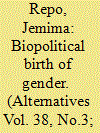

|
|
|
|
|
| Publication |
2013.
|
| Summary/Abstract |
This article argues that gender was invented in the 1950s as a new sexual apparatus of biopower. Through a reading of mid-century sexological studies against the background of structural-functionalist and behaviorist theories of social order, it shows how gender was born in the clinic to discipline the reproduction of life in new ways. The truth of sex was no longer found in the genitals or mind, but in the contingent cognitive processes of a behavioral control system. The gender apparatus produced systematized protocols for sex reassignment surgeries for infants with ambiguous genitalia and rendered the family a panoptic institution, all to ensure that children were socialized into normative gender roles guaranteeing the continued reproduction of the life of the species. The violence of this new life-administering technology was crystallized in the pedagogical techniques employed by physicians designed to persuade their child patients to submit themselves to the normalizing care of surgeons and psychiatrists.
|
|
|
|
|
|
|
|
|
|
|
|
|
|
|
|
| 3 |
ID:
073522
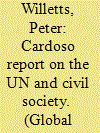

|
|
|
|
|
| Publication |
2006.
|
| Summary/Abstract |
The Report of the Panel of Eminent Persons on United Nations-Civil Society Relations was published in June 2004. It strongly endorsed the case for wider participation of civil society in all aspects of the UN's work, both at the headquarters and at the country level. However, the panel members displayed little understanding of the existing NGO consultative arrangements. Many of its recommendations were impolitic or impractical. The report was intellectually incoherent because it embodied three competing theoretical frameworks: functionalism, neocorporatism, and democratic pluralism. The functionalist emphasis on expertise and the neocorporatist emphasis on engaging stakeholders cannot offer criteria for participation on an all-embracing democratic basis. Reform is needed to provide facilities and resources to enhance participation by marginalized groups.
|
|
|
|
|
|
|
|
|
|
|
|
|
|
|
|
| 4 |
ID:
138081
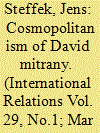

|
|
|
|
|
| Summary/Abstract |
In this article, I engage with the normative foundations of David Mitrany’s international political theory. My aim is to show that there is more to be found in Mitrany’s approach to international organization than the technocratic problem-solving often associated with his name today. To pinpoint the essence of Mitrany’s normative thought, I introduce the term ‘functional cosmopolitanism’. This variety of cosmopolitan theorizing starts from the equality of individual needs (not from rights or obligations), suggesting that transnational institutions, rather than states, should cater to these needs. An important aim of this ‘functional devolution’ is to limit and reconfigure public power, thus countering the threat of an ever more powerful nationstate. Mitrany’s proposal for introducing a functional dimension into the political system can be interpreted as a ‘thin’ cosmopolitanism, designed to free citizens from war and oppressive concentrations of political power, but vague in its ideas about individual political engagement.
|
|
|
|
|
|
|
|
|
|
|
|
|
|
|
|
| 5 |
ID:
171941
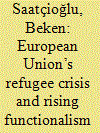

|
|
|
|
|
| Summary/Abstract |
This article investigates the evolving relationship between the European Union (EU) and Turkey following the 2015 refugee crisis. It argues that post-crisis relations have become predominantly functional, measured by strategic EU-Turkey partnership based on interdependence as well as the EU’s relative retreat from political membership conditionality. This is particularly demonstrated by the March 2016 EU-Turkey ‘refugee deal’ whereby functional cooperation deepened amidst material and normative concessions that the EU granted Ankara. The article concludes that although functionalism is set to guide the relations beyond the question of Turkey’s EU accession, a future EU-Turkey external differentiated integration arrangement remains uncertain due to pending challenges.
|
|
|
|
|
|
|
|
|
|
|
|
|
|
|
|
| 6 |
ID:
123656
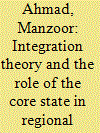

|
|
|
| 7 |
ID:
113733
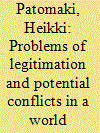

|
|
|
|
|
| Publication |
2012.
|
| Summary/Abstract |
There are good security and political economy reasons for furthering integration towards a world political community (WPC), possibly assuming the form of a world state. However, would these reasons provide a legitimate and sustainable basis for the WPC? It is argued in this article that, while the standard security-military and functionalist political economy arguments for world unification may work to a certain point, they are insufficient and may become counterproductive. Especially if perceived in terms of rationally calculative orientation of action, they are not enough and may even work against the WPC. There must also be a belief in normative legitimacy, which may be anchored in universal principles such as popular democracy and human rights. In this light, theories of civilizing process and stages of ethico-political learning are explored. Collective human learning not only explains the quest for democratization but also points towards cosmopolitan ethico-political sentiments. However, there is an internal relationship between democracy and identity, and identities tend to be particular. The case is made, first, for thinking that the otherness of one's narrated 'self' can be located either in the past or, alternatively, in our contemporary being, when seen from a point of view of a possible future position in world history. Second, within a higher level identity-in-difference, a co-constitutive and mutually transformative relation between self and others can involve letting many differences just be.
|
|
|
|
|
|
|
|
|
|
|
|
|
|
|
|
| 8 |
ID:
174887
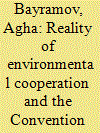

|
|
|
|
|
| Summary/Abstract |
Using insights from classical functionalism, this article analyses the complex relationship between the Convention on the Legal Status of the Caspian Sea and the Caspian Environment Programme (CEP). The article pursues three objectives. First, it shows how shared ecological issues challenged individual littoral states and brought their respective governments under the CEP umbrella in 1998. Second, it shows how key actors (UNEP, UNDP, GEF, and World Bank – besides states) are involved in shaping the politics of the Caspian Sea region and how their preferences, both political and economic, and networks affect the capacity, opportunity and will of governments (e.g., ministries, parliaments and presidents) to cooperate. Third, it explains the link between low environmental politics and the uncertain legal status of the Caspian Sea. I find that lessons learned from environmental cooperation spilled over into the discussion of the legal status of the sea, which culminated in the signing of the Convention.
|
|
|
|
|
|
|
|
|
|
|
|
|
|
|
|
| 9 |
ID:
127775


|
|
|
|
|
| Publication |
2014.
|
| Summary/Abstract |
This paper reviews the perceptions of the CA states (Kazakhstan, Kyrgyzstan, Tajikistan and Uzbekistan) towards the Shanghai Cooperation Organization (SCO) and conceptualises the CA states' motivations and concerns in engaging in cooperation within the SCO vis-à-vis China. The message that this paper aims to deliver is that, for the majority of the CA leadership and public, China within the SCO represents the CA states' 'other', with decolonising but increasingly dominating features. These perceptions of China in the CA region elucidate the ways in which China's involvement in Central Asia has a paradoxical and contradictory impact on the potential for the SCO to move beyond functionalism and towards the creation of a broader SCO identity. Consequently, the future of the SCO may be more limited than the West fears and Central Asia hopes.
|
|
|
|
|
|
|
|
|
|
|
|
|
|
|
|
|
|
|
|
|